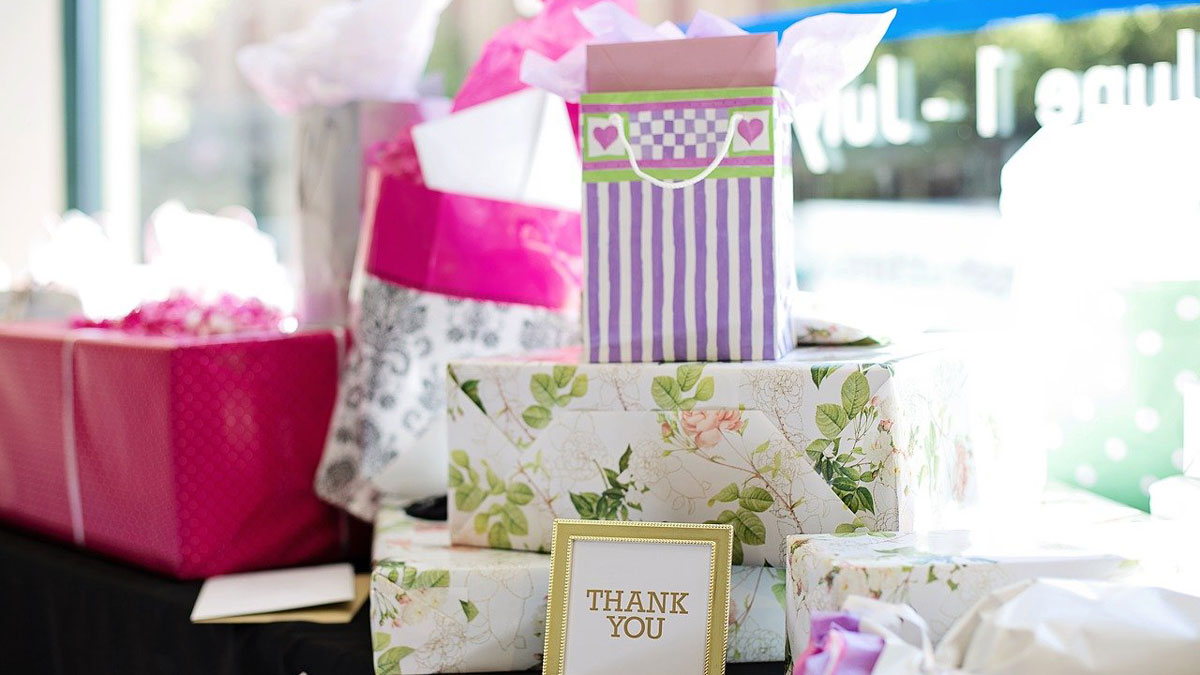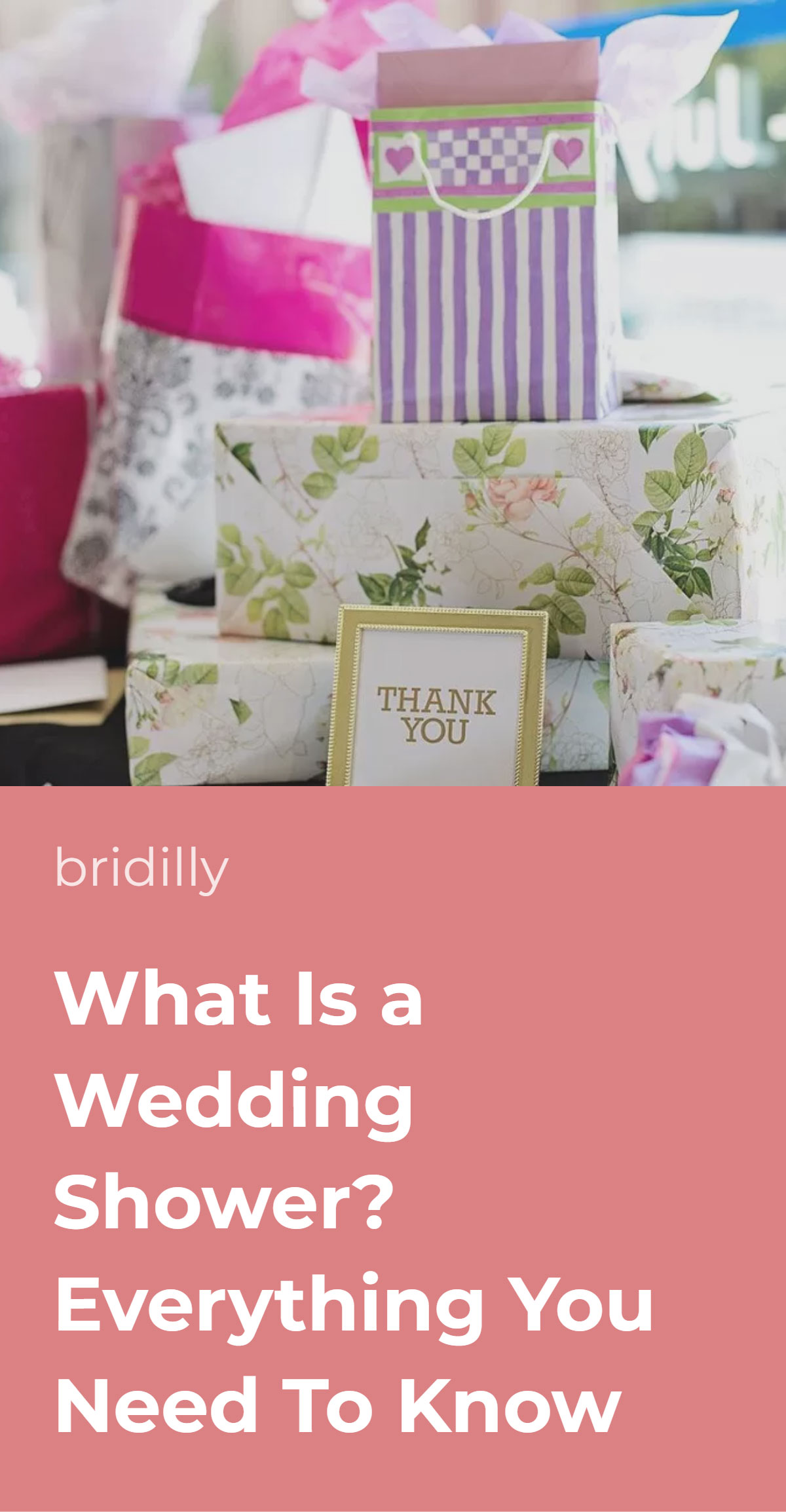Everyone knows what’s an engagement party or a bachelor’s party. But what is a wedding shower?
The array of events related to weddings can get confusing. What is a couples’ wedding shower purpose? Is a wedding shower different from a bridal shower?
Wedding showers originated as a modern take on the bridal shower tradition. As the name suggests, bridal showers revolve around the bride and were initially women-only events.
On the other hand, wedding showers are more inclusive. They celebrate both partners with their soon marriage rather than solely the bride.
Due to such neutrality, wedding showers are also preferred by same-sex couples when there is no bride (or two brides).
Table of Contents [show]
Wedding Shower Purpose
The purpose of a wedding shower, also known as the Jack and Jill shower, is to celebrate the couple with their upcoming wedding, share advice about married life, and give gifts.
Since wedding showers originated from the bridal shower tradition, gifts are an essential element of the event. Back in the day, women gathered and brought gifts to the bride to serve as a dowry.
Americans don’t have a dowry system, and the event’s focus shifted from the bride to the couple, but the tradition remains strong.
A couples’ wedding shower is different from an engagement party. While the engagement party celebrates the fact of engagement, the wedding shower should prepare the partners for their new family roles.
Who’s Invited?
The simple answer to “who is invited to the wedding shower?” is – anyone and everyone. Unlike the bridal shower, the wedding shower isn’t limited to guests from the bride’s or groom’s side or specific sex.
Traditionally, wedding showers involve the couple’s closest friends, bridesmaids, groomsmen, immediate and extended family members, and anyone else.
An essential point of the wedding shower etiquette is to only invite people invited to the wedding to avoid drama.
Note that the wedding shower guest list doesn’t have to be identical to the wedding guest list. The couple may leave out people who aren’t as close to them, such as colleagues and acquaintances.
Wedding guest lists can include hundreds of people. In contrast, wedding showers are typically relatively small events for the dearest people who truly care about the couple.
Sometimes, a wedding shower is a surprise. In this case, the hosts should be very careful creating the guest list, ensuring they don’t leave out anyone important for the couple.
Who Hosts The Party
Wedding showers are a modern take on bridal showers, so they have many similarities. Like bridal showers, wedding showers are traditionally hosted by the couple’s close friends or family members rather than the bride and groom themselves.
Organizing an entire party on one’s own is a challenging task, so the wedding shower typically has multiple hosts. Even if there’s only one person responsible for the organization, other wedding party members can chip in for the food and venue.
The most common couples’ wedding shower host options are the couple’s parents, extended family members, maid of honor and best man, or all bridesmaids and groomsmen.
Participation in planning is always voluntary. There are no strict rules stating that the parents, the maid of honor, or anyone else have to help with planning and paying. They are free to refrain from it if they don’t have the time or money.
The couple can take part in organizing the party, too. Often, the wedding shower is a surprise, but surprise parties have some pitfalls.
Firstly, the hosts must guess a date when the couple is free. Secondly, the couple may simply not be up to another party and not want the extra attention. In most cases, communication with the couple is a must.
Wedding Shower Timeline
The wedding shower is meant to celebrate the couple with their upcoming wedding and therefore takes place close to the big day.
However, the party shouldn’t be too close to the wedding because the couple’s last weeks of planning tend to be extra busy.
Three months to three weeks before the wedding is a sweet spot for a wedding shower. It’s close enough to tie the event with the wedding rather than the engagement but gives the couple enough time to prepare for the big day.
When choosing the date, the wedding shower hosts should ensure that the couple doesn’t have any plans scheduled, such as cake tasting, meeting with the wedding coordinator, or tailor’s appointment.
The wedding shower also shouldn’t overlap with the bachelorette or bachelor parties. The best practice is to allow at least a week between the events to give everyone time to relax.
If many guests arrive from different towns, the wedding shower, bachelor, and bachelorette parties can take place during the same weekend to minimize traveling.
As for the time of the day, wedding showers can take place during the day or in the evening, depending on the couple’s preference, location, activities, and guest list.
If kids or elderly people attend the event, daytime is preferable. On the other hand, if all the guests are young, you can opt for a late-night wedding shower.
Send the invitations six to four weeks before the event to give everyone time to prepare, especially if guests need to travel. You may send the invitations by post or e-mail.
Where to Host The Party?
The wedding shower location ideas are vast. You can pick any place you deem appropriate as long as it can fit all guests.
For example, bridal showers are traditionally held at the host’s home, but the wedding shower guest list may be too long for a backyard party. However, if you have a big, nice garden, it’s a valid option.
Often, wedding showers take place at rented venues or restaurants. A beach or a pool party are excellent choices for a wedding shower on a hot summer day.
When choosing the wedding shower location, ensure that everyone invited can get there. If many guests live out of state, ensure they can travel.
Cases where the couple lives out of state and all guests live close to each other are tricky. On the one hand, it’s the couple’s party, and forcing them to travel can be seen as rude.
On the other hand, asking dozens of guests to travel instead isn’t wise from a logistics standpoint. Communication with the couple in such cases is essential to find a compromise.
Theme
Wedding showers often have a theme. It doesn’t necessarily have to be the same as the wedding theme, but it should appeal to both the bride and the groom.
Think of what the couple truly loves and what connects them. If they’re both bikers, choose a biker-themed wedding shower. If they admire everything vintage, opt for a 1950’s-inspired party.
Don’t choose anything appealing to only one of the partners, even if you’re related to them and don’t know the other one well. Consulting with someone from the second partner’s side is always a good idea.
The party’s theme dictates its location, activities, dress code, and menu. For instance, a nautical wedding shower theme requires a beach setting and seafood selection, while a rustic party can take place in a barn or lavender field.
If you can’t come up with a specific theme, pick a color scheme to create the desired atmosphere and keep the venue classy.
Activities
Wedding shower activities largely depend on the guest list, location, theme, and couple’s preferences. Traditionally, the couple opens their gifts in front of everyone. Note that some couples may find this custom embarrassing.
If you’re sure the couple wouldn’t mind, make the process more fun with gift bingo or gift guessing. Additionally, the wedding shower may involve games and competitions.
However, relaxed wedding showers revolving around social interactions rather than games are also common. Think fluid seating, good food, and long talks.
In any case, all guests should be able to patriciate. Avoid extreme sports if you invite the couple’s grandparents and drinking games if you invite children.
Gifts
Gifts are an integral element of any wedding shower. The golden rule is to bring gifts that the couple can use together. It could be household items, dinner for two, coffee brewing classes, or anything else both partners would enjoy.
Some couples have a wedding gift registry. Choosing a gift from the registry is good etiquette, but buying a different gift isn’t rude.
Many people nowadays give money or gift cards. Monetary gifts are always appreciated because the couple can choose what to buy themselves. Furthermore, weddings are costly, and the partners likely need the money more than ever.
However, monetary gifts lack personality. It’s best to leave them for the wedding and give something more unique for the wedding shower.
Dress Code
The wedding shower dress code can vary. As a rule of thumb, smart casual attire is always appropriate, especially if the party takes place in the daytime. However, you should also consider the location, theme, and activities.
A suit isn’t the best fit for a pool party or camping, just like leggings and sneakers aren’t appropriate for a restaurant. The hosts should mention the dress code in the invitations to avoid confusion.













No Comments Add one
Leave a Comment